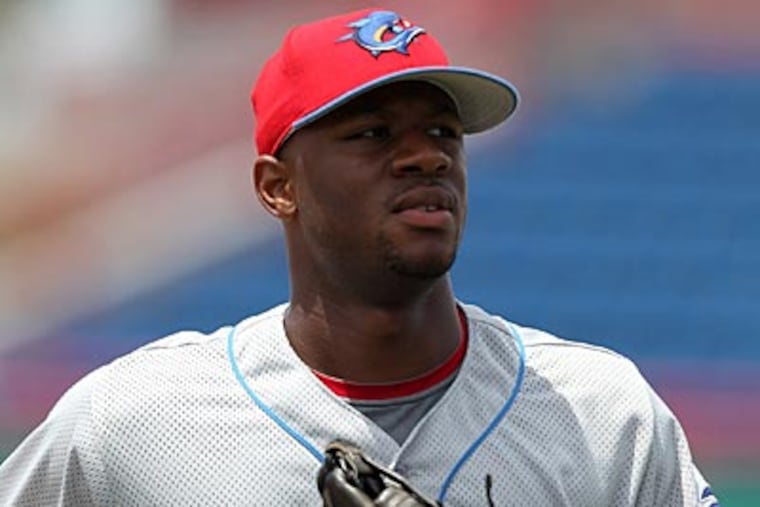Hewitt's talent still tantalizes Phillies, despite all the strikeouts
CLEARWATER, Fla. - Anthony Hewitt has that special quality scouts love to talk about. When his bat meets ball, it makes a different sound: a sweet, explosive crash made possible only through the combination of superior quickness and strength.

CLEARWATER, Fla. - Anthony Hewitt has that special quality scouts love to talk about.
When his bat meets ball, it makes a different sound: a sweet, explosive crash made possible only through the combination of superior quickness and strength.
The problem for Hewitt since the Phillies made him their first-round draft choice in 2008 is that his at-bats have ended far too often with the quiet swoosh of a swinging third strike or the loud pop of a catcher's mitt on a called third strike.
By now, Hewitt admits, he thought he'd be a starting outfielder for the Phillies in Philadelphia.
Instead, he has yet to climb as high as the double-A Phillies in Reading, and when it was time to put together the 40-man roster last offseason, it was not all that difficult to leave Hewitt's name off it. Hewitt, 23, said he was not disappointed.
"No, I didn't produce like I should have," he said. "The only person I can blame for that situation is myself. You didn't produce like you were supposed to and I wouldn't protect me either."
The Brooklyn-born Hewitt, who received a $1.38 million signing bonus after being drafted out of Salisbury High School in Connecticut, may not be on the 40-man roster, but that sound when bat meets ball and his athleticism in the field will keep the dream alive for the Phillies for a while.
"George Kissell, the old St. Louis Cardinals scout, used to say you need 1,500 at-bats," Phillies assistant general manager Benny Looper said. "He's got more than 1,500 at-bats, but some guys you stick with because they have a chance to be an impact-type player."
Hewitt is actually still slightly shy of 1,500 at-bats, and since the calendar turned to May this season, the single-A Clearwater rightfielder has played some of the best baseball of his professional career. After opening the season on the disabled list because of a wrist injury and strained quad, Hewitt opened the season at Clearwater 2 for 18.
By the end of the month, he was still hitting only .170. But since the start of May, he had batted .290 with three home runs and 12 RBIs entering the weekend.
"He's had a nice little run here and it's something we hope keeps going," Clearwater manager Chris Truby said. "If he stays in the strike zone, he's going to hit. I think that's a big deal for him and it has been a big deal for him since he's started. He's laying off some tough breaking balls, and now when he's getting a pitch to hit he's not missing it."
Hewitt's strike zone education has been the key to his failure, and he was in the midst of another slide last week, going 3 for 23 with seven strikeouts in his last five games before Saturday.
Going into this season, Hewitt had struck out 439 times and walked just 46 times in 1,244 at-bats. That's one strikeout every 2.8 at-bats, an alarmingly high number, especially for a guy who almost never walks. This season he has struck out once every 3.4 at-bats. That's still too often, but it is an improvement.
"The biggest improvement I've seen is he's recognizing breaking pitches," Looper said.
Looper has been in scouting and player development for 25 years, so he has seen some guys become big-time players who looked as if they'd be done in by their inability to hit a breaking ball when they were in the minors.
"I don't know what their averages were, but I can think of three guys who couldn't hit a breaking pitch in the minor leagues," Looper said. "Matt Williams was one of them. Juan Gonzalez, even in double-A he couldn't hit a breaking pitch, and Ruben Sierra had a real hard time with the breaking pitch. They may have put up better numbers, but it took them a while to recognize a breaking pitch."
Those three may have had some issues with the breaking ball, but they were all far more advanced in their careers at age 23 than Hewitt is now.
At best, Hewitt is considered a long shot to not only fulfill the expectations of a first-round pick, but to also make it to the big leagues. To Hewitt's credit, he still has a lot of confidence and a strong work ethic.
"Nothing is easy in life if it's worth having," Hewitt said. "Coming out of high school, I put in the work and it just didn't happen as quickly as I thought it would. No big deal. I just keep trying. I know I can do it. When all my tools come together, I'm unstoppable, but the only person who is going to believe in myself is me."
TOP 25 PHILLIES PROSPECTS:
philly.com/philliesprospects
MULTIMEDIA COVERAGE: philly.com/minors
EndText